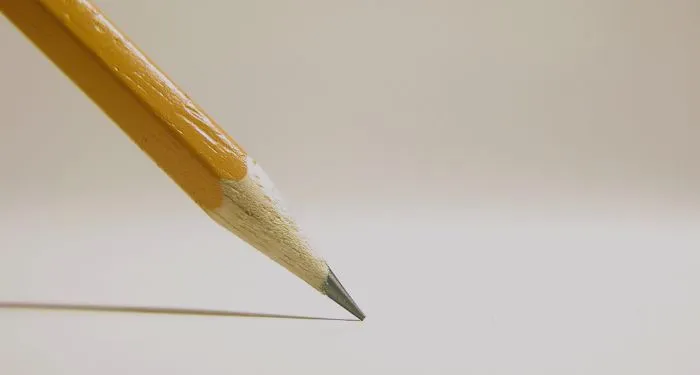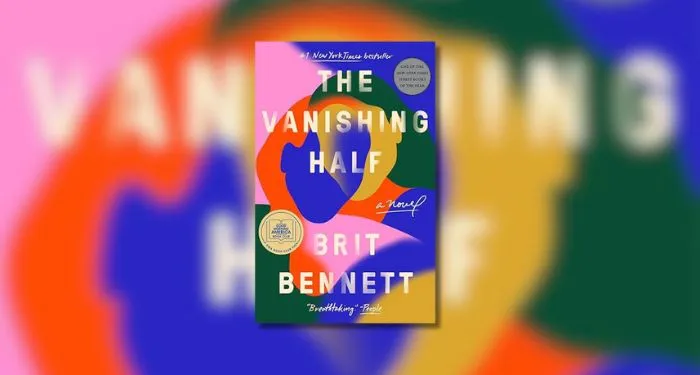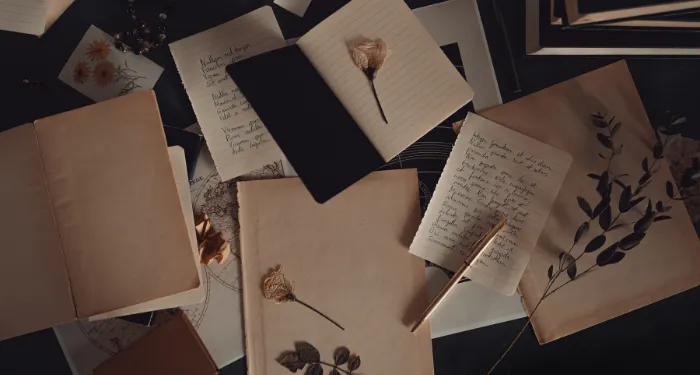I had been in Paris for more than a week when Gaza surfaced again, like a scar the body has come to accept. On the train to Argenteuil I sat facing the wrong way—which most people avoid for the dizziness it causes—as my phone lit up with notifications, either bearing news of Gaza’s unfolding sorrow or messages from loved ones that calmed my anxious heart.
I scanned the faces around me, a habit I’ve carried since childhood. Quiet features, soft murmurs, the hush of exhaustion after a long day. I turned to the window, watching the sun drift behind clouds, and I noticed how the road ran in reverse, how the buildings seemed to flee against the wind.
Then a scene from my final evening in Gaza came back to me. Returning home through the city that night in April, my cousin Shahd and I boarded a bus from Saraya Junction to the far end of Al-Jalaa. With transportation scarce, we didn’t hesitate: I climbed into a backward-facing seat. And there it unspooled—the city in ruins—like a shot in a film. My mind went dizzy with all the contradictions we had faced there, our lives held in this unraveling image.
Now it all reappeared in a flash: the war-scarred streets, the buried homes, the shattered walls. How had I held on to every detail of the damage, after trying so hard to repair it in my mind? Longing surged through me, along with tears I had deferred. And there I was, despite all my attempts to flee: facing the city I had left behind.
*
At first we convinced ourselves that the chance for me to leave was some kind of joke. Now the joke was over. I took my last step toward the bus that would carry me to another side of the world. My eyes moved across the city, trying to catch a single image—one more moment in its embrace. Fear led me to my mother. I searched her hands to find some tenderness in parting, even in its cruelty. She wrapped me in prayer, a quiet shelter. With my face in her palms, I felt something no one had ever described before.
I passed next through the arms of my father and brothers, memorizing their faces, leaving pieces of my own on their shoulders. I waited in the bus for over an hour. Through the window I saw them still: mother, father, three brothers, and Shahd, waiting in heavy silence for my face to disappear, perhaps for the last time.
I looked to the sky. Morning shimmered at the edges of the fading night. I hoped my childish heart would learn to harden, to endure the ache of leaving. As the bus started moving I pocketed the image of six hands waving—of six faces smiling or choked with tears. The growing distance between us brought the goodbye to an end, like an unfinished sentence. I turned back again and again until I could no longer see them.
Because I had come to know Deir al-Balah well in that final year, I gave it, too, a long goodbye as we passed through on our way south, smiling at the streets where my loved ones had walked. I poured a river of prayer into them—for protection, for peace—and moved on, my body weighed down by a brutal question: What now?
*
Suddenly the bus slowed, as if held back by the sheer weight of fear inside us—all of us who were being forced to flee a city under siege. It stood still for more than fifteen minutes. No one moved. The air crackled with anxiety. Phones were shut off. Even whispers ceased. We were at the first stop: Khan Younis. Behind us the city, ahead of us ruin. Houses had vanished, leaving behind only their bones. The driver’s phone buzzed on his thigh. We moved forward.
At Rafah we saw the ghost of what had once been a haven for over a million Gazans during seven months of war. There was nothing left to indicate a life had been lived there. Buildings, stories, wounds had turned to sand.
We passed streets that may have once known us, though we no longer knew them. Another stop. No one asked why. No one was surprised. A moan swelled in our chests. The wait dragged on. Children broke the silence, rebelling against the fear of the grown-ups with the honesty only innocence allows—like the boy who made everyone laugh by asking, “When do we get on the plane?” A reasonable question in any other geography.
At the Kerem Shalom crossing, we waited for permission to open the gate. I looked back, hoping for one last glimpse of the city. But it wasn’t the city I remembered.
We stood in line under a cruel sun, its heat matching the fury in our blood. Around us lay empty warehouses that might have brimmed with crops and produce had the siege not tightened weeks before. Our bags had been stripped of everything but our phones, chargers, and the papers we needed to leave. You take nothing with you—your home is in your heart now, your country wherever your steps may lead.
After we were processed, a worker nodded: go. I paused, lingered, then walked forward. When we met the consular delegation, I knew: Gaza had let go of my hand, and a new chapter of life had begun.
*
Gaza’s face disappeared, and in its place rose a dream we never dared believe we’d see. In the books of childhood and the lessons of youth, we had learned its names, read its poems, listened to songs that praised its beauty but never did it justice. Through the windows of the bus, we passed lands our sight had been denied. The mind faltered before such enchanted earth: vast plains crowned by the shore of the Dead Sea, mountains and rocks carved with precision, and small houses—cities—huddled on the horizon. I gave my eyes and heart freely to the view, trying to hold it tight.
Then, like a pinch that brings pain, a jeep appeared. Another in front. Another behind. As if to wrap each wide-eyed traveler in chains. Now the vista exhausted me; the army vehicles reminded us that this landscape too is bound. Seventy-seven years of theft, piece by piece. An endless stream of blood, tears, longing. A sorrow that began with our lives and will not end until the occupation does.
I followed every sign—two names on each, yet my eyes only recognized what I already knew. The bus sped along the highway too swiftly for me to take it all in, but through the signs I saw the roads to Haifa, to Jaffa, to Jerusalem. I tried to stretch my sight past the horizon, hungry for a wider view.
I do not know how many hours we traveled. My eyes never left the window, my neck grew stiff from looking too long. A pain I welcomed. I remember it now every time someone asks me how the journey was, and I say: “Our country is a paradise.”
At King Hussein Bridge, at the Jordanian border, we waited more than three hours. In that time I rewound the story from the beginning, eight days earlier, when the French consulate called to tell me that I was one of more than a hundred people from Gaza—teachers, artists, students, scientists—whom they would be able to evacuate. I considered the weight of the journey and our inexplicable resilience. I wondered: Why keep chasing life when death lays its traps everywhere?
But I wasn’t seeking an answer. Gazans know who we are. We maintain our right to live in the face of those who wish us gone. We knead futures from the dough of the impossible. Even when denied we mock the deprivation. And though we sow with bloodied hands we still reap fruit. I did not blame myself for leaving. My conscience did not judge me. There was only a quiet failure to grasp why surviving is so bitter.
*
Only when permission finally came for the bus to move again and the driver called out “Welcome to Jordan” did I fully believe my new life had begun. That I was now outside the land to which I will one day return. As we drove through the streets I found myself inspecting their houses out of habit: Had a wall collapsed? Were their windows intact? How many of them had trembled under missiles? When I realized the answer, a hollowness settled inside me. I asked the young woman next to me, who only said, “We never really move on.”
That night I did not miss the drones buzzing above my head. No explosions pulled me from sleep. In the morning I walked the streets of Amman, curious about what life looks like in daylight. I wasn’t angry. I didn’t question. I simply lived an ordinary day, shared it with my friend who’s been in Jordan for two years.
When the calm night came again, we made our way to the airport. A long wait, unsurprising. A delayed flight, unexplained. Another wait. I didn’t feel much. My body moved on orders. My ears caught idle chatter—not searching for information, only to pass the time.
We boarded the plane. It climbed above the clouds. Others stared, dazzled by the unfamiliar sight. But emptiness had claimed my heart. I lifted my camera—not out of amazement but to document a moment my mind had no strength to feel.
The flight was long. I remembered the requests of family and friends: Pray for us. I did what they had asked and prayed—empty of awe but full of faith. Time passed without resistance, without haste. When the plane landed in Paris and my body followed the stream of passengers down the aisle, I looked to the sky, hoping only to feel safe. Around me faces gleamed with the anticipation of reunion, of the moment stories find their endings. I was welcomed by Malika and Ratiba, two Moroccan women who had volunteered to receive us. When Malika embraced me, every emotion I had abandoned returned in full force. My mind flared with a fire I couldn’t name. And for the first time I wept like someone utterly alone.
*
Before my drowsy eyes, France appeared in all its grandeur. I didn’t pay much attention to the road, more attuned to Malika’s efforts, in gentle Arabic, to soothe the anxiety that quickened in me with every street we passed.
We arrived in Argenteuil, a quiet suburb with a large Arab community, at the home of Najat—a Tunisian woman who turned my first days of apprehension into calm. She met my fear with a hand like my mother’s. She opened her house and her heart to a Gazan girl who for a year and a half hadn’t known how the world spun.
She listened to our stories and her face paled. She told her own to tame the strangeness in me, to make exile a warm place. I left Gaza knowing I would learn new meanings for every word. But Najat, named for rescue, was both noun and verb.
I walked the streets bright with trees and flowers, rode the train for the first time, read the signs, tried to learn French from the sounds Najat made. And in those early encounters—with people, with places—Gaza rose within me. In the street, the park, the church, the supermarket, the restaurant. Before grand buildings and humble ones. In the train, on the bus, in silence or in noise, in light or in shadow—it returned to me. A presence proud and defiant even as it bleeds. Its children know it and defend it even when its voice burns our throats and its memories blacken our sleep. It breathes in us—its people, its air, its ancient sea—as we face the immensity of all that is new. And it leaves us with the amulet of a life stolen from beneath its fingertips.



















 English (US) ·
English (US) ·